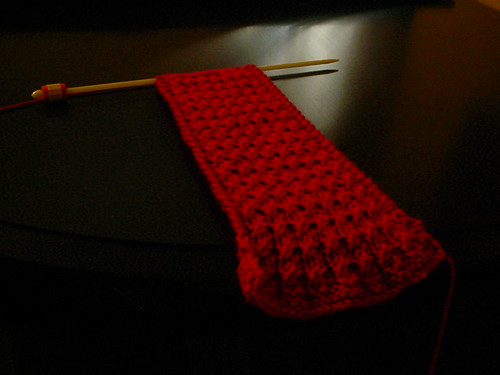It also makes a thick, "scrunchy" fabric that I think will be nice for a warm scarf. I may wind up doing another one of these later, for myself, out of some of the yarn I have stockpiled in my "ooh, that's pretty, I want a scarf of that someday" box.
It's hard to photograph though.

I would have gotten farther on this but I realized the middle of this afternoon that if I were going to do house cleaning before I went on break (which I really prefer to do if at all possible), today would have to be the day. So I put the knitting aside and cleaned house. And now I'm glad I did it.
I also did do a bit more on the back of the Ropes and Picots cardigan; I think it will be a work-on-it-on-break project. I may post a picture of that tomorrow if I get any further on it - I just started the "rope" pattern (which is another use of the twisted-stitch.)
I also finished reading "A Distant Mirror" last night. I think my main reaction is that the 14th century is nice to read about, but I wouldn't want to live there. It seems that the way wars were fought were really stupid - and the wars were over stupid things some of the times. And the "companies" were scary - basically, groups of armed brigands with fungible loyalties who might come into a town or city and mess it up and steal things and kidnap people. And, as I said before, except for a VERY few women (like Christine de Pisan and that anatomist, I forget her name now), life pretty much stunk if you were female. (Well, it stunk too if you were male, but I think it stunk a little more for females, at least females in the nobility as compared to males in the nobility). And there was a great deal of corruption...I can see now that there were a lot of threads and streams that led up to the Reformation, it wasn't just Luther finally deciding he had had it and nailing his theses to the church door. (There was Wyclif, and Jan Hus, and others, before Luther, that, if they weren't actually Protestant, were certainly anti-Church-hierarchy. And anti-the-corruption-they-saw-among-some-priests-and-bishops.)
Not sure what non-fiction I'm going to pick to read next. I'm not sure I'm ready for another sweeping book of history, especially one highlighting so much human selfishness and stupidity.
No comments:
Post a Comment